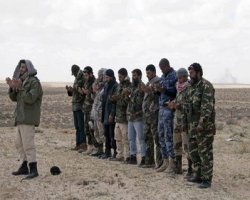There are unconfirmed reports that more people have left the inner circle of Muammar Gaddafi, the Libyan leader, following the high level desertion of Moussa Koussa, Libya's foreign minister, who arrived in the UK on Wednesday.
It is understood a group of top officials who had headed to Tunisia for talks have decided to stay there.
Some Arabic newspapers said Mohammad Abu Al Qassim Al Zawi, the head of Libya's Popular Committee, the country’s equivalent of a parliament, is among the defectors, and reports of other defections, such as that of top oil official Shokri Ghanem, remain unconfirmed.
Shokri issued a statement on Thursday denying his defection, telling Reuters news agency that he was speaking to them from his office.
Nazanine Moshiri, Al Jazeera's correspondent in Tunis, said that Abu Zayed Dordah, Libya's prime minister from 1990 to 1994, has also been mentioned as one of the high-profile defections.
And on Thursday, a second top official confirmed that he would not serve in Gaddfai's regime.
Ali Abdessalam Treki, a former foreign minister and UN general assembly president, had been named to represent Libya at the UN after a wave of defections early in the uprising.
Treki, who is currently in Cairo, said in a statement posted on several opposition websites that he was not going to accept that job or any other.
Meanwhile, Gaddafi has struck a defiant stance, saying he's not the one who should go - it's the Western leaders who have decimated his military with airstrikes who should resign immediately.
The Libyan leader's message on Thursday was undercut by its delivery - a scroll across the bottom of state TV as he remained out of sight as he accused the leaders of the countries attacking his forces of being "affected by power madness".
'Crumbling from within'
William Hague, Britain's foreign minister, said that Koussa had not been offered immunity from prosecution and is "voluntarily talking" to authorities.
Koussa was staying in a safe and secure place and engaged in ongoing discussions with British diplomats, including some who worked at the now-shuttered embassy in Libya, Hague said.
"His [Koussa's] resignation shows that [Muammar] Gaddafi's regime ... is fragmented, under pressure and crumbling from within," he said.
Hague said Koussa had been his contact with the regime in recent weeks and that he had spoken with him several times.
'Tight security'
Many Libyan government figures have resigned since the uprising against Gaddafi began on February 15.
Interior minister Abdel Fattah Younis and justice minister Mustafa Mohamed al-Jalil have both left, as have numerous ambassadors around the world.
Most high-level Libyan officials are trying to defect but are under tight security and having difficulty leaving the country, a top Libyan diplomat now supporting the opposition said on Thursday.
Ibrahim Dabbashi, Libya's deputy UN ambassador, said that Libya's UN mission, which now totally supports the opposition, knew two days in advance that Koussa planned to defect on Wednesday.
He said the mission had been waiting for about 10 days for Thursday's defection of Ali Abdessalam Treki, a former foreign minister selected by Gaddafi to be the new UN ambassador.
"We know that most of the high Libyan officials are trying to defect, but most of them are under tight security measures and they cannot leave the country," said Dabbashi.
"But we are sure that many of them will benefit from the first chance to be out of the country and to defect."
'Status reviewed'
Before Koussa's defection, the Nicaraguan government said he sent a letter appointing Miguel D'Escoto Brockmann, a former priest who served as Nicaragua's first foreign minister after the 1979 Sandinista revolution, as Libya's new UN ambassador.
A news conference with D'Escoto, scheduled by Nicaragua's UN mission, was postponed from Thursday to Friday and then postponed again, with no future date announced. The mission gave no explanation for the delays.
Farhan Haq, a UN spokesman, said the UN had not officially received any letter from Libya regarding a change of credentials involving D'Escoto.
He said the UN did receive a copy of a note from Nicaragua addressed to all UN missions which attached a copy of Koussa's letter to the secretary-general, but he stressed that the UN had never received that letter.
Susan Rice, the US ambassador to the UN, said on Wednesday that D'Escoto needed a G-1 visa, the US visa required for diplomatic representation, if he wants to represent Libya.
Lockerbie questions
Scottish authorities said on Thursday that they wished to interview Koussa over the 1988 Lockerbie bombing.
"We have notified the Foreign and Commonwealth Office that the Scottish prosecuting and investigating authorities wish to interview Koussa in connection with the Lockerbie bombing," Scotland's crown office said in a statement.
"The investigation into the Lockerbie bombing remains open and we will pursue all relevant lines of inquiry."
The bombing over the Scottish town in 1988 killed 259 people, mostly Americans, on the plane and 11 on the ground.
Last month, Mustafa Abdel Jalil, the former Libyan justice minister and leader of the opposition's interim national council, said that Gaddafi ordered intelligence officers, including the convicted bomber Abdel Baset al Megrahi, to carry out the bombing.
PHOTO CAPTION
Libyan fighters pray in the road between Ajdabiya and Brega, Libya, Thursday, March 31, 2011.
Al-Jazeera


 Home
Home Discover Islam
Discover Islam Quran Recitations
Quran Recitations Lectures
Lectures
 Fatwa
Fatwa Articles
Articles Fiqh
Fiqh E-Books
E-Books Boys & Girls
Boys & Girls  Ramadan
Ramadan Fatwa Audios
Fatwa Audios Month of Mercy
Month of Mercy Women
Women Eed Al- Fitr
Eed Al- Fitr Food Recipes
Food Recipes Videos
Videos

 Prayer Times
Prayer Times












